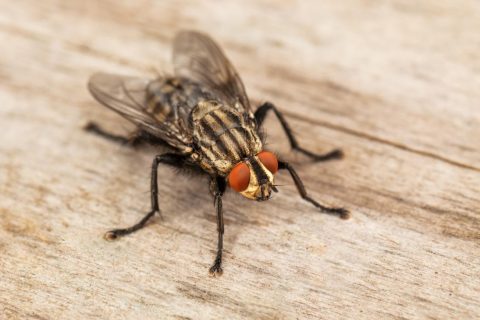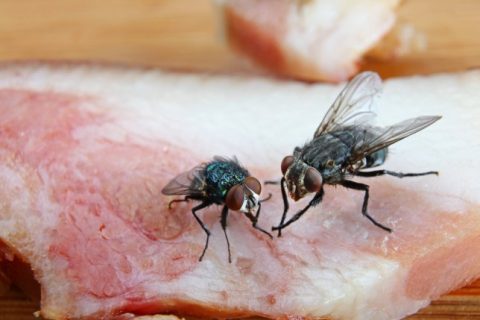Any Questions? Call us today!
All You Need To Know About Flies


All You Need To Know About Flies
Flies are annoying insects that are buzzing around and can make people and pets uncomfortable, but they are also a serious threat to public health because they can carry diseases. So they are dangerous for people’s homes but also for restaurants and stores that are not keeping food covered and protected. In this article we will talk more about these nasty insects and find out how to get rid of them.
Flies do not bite or sting people directly, but they are known to spread more than 200 pathogens and parasites to humans. They usually feed on trash cans, decaying flesh, rotting food and manure, and that’s where they get all the nasty parasites from. Then, when the fly lays on a piece of meat in your home or restaurant, that piece will get infected. Some of the major diseases caused by flies are the typhoid, the cholera and the dysentery.
Common Types of Flies
There are many species out there, but the most common ones are:
The House Fly – this small insect can be found all over the world, and can be recognized by the fourth wing vein being sharply angled and the four dark stripes on the top of its thorax. A female can lay 5-6 batches of 75-100 white oval eggs. If the weather is warm enough, these eggs can hatch in just 12-24 hours and start feeding on the source of food they were born in. These larvae will need 4 to 7 days to turn into adult flies, and they will be ready to mate as soon as they emerge. They like to lay their eggs on meat, animal manure, human faeces, garbage, decaying fruits or vegetables and others.
The Blow Fly – The adult has a shiny metallic colouring, with bodies that are either blue, green or black. They have bristles on their meron and a well-defined posterior calli. The name comes from an old English expression which said that meat with fly eggs on it was “fly blown”. Adults are attracted to flowers with odours that resemble rotting meat, and the larvae are scavengers of carrion and dung. They lay eggs on dead animals, and then the larvae feed on the decaying flesh. So these insects do play an important role in the ecosystem. Sterile blow flies were even used during the war in order to remove decaying tissue and prevent bacterial growth in open wounds.
The Fruit Fly – while they do not consume meat, they are still a problem because they destroy fruits and vegetables displayed in markets or stores. Their back is black while the front part is tan, and they usually have red eyes. They lay their eggs on the surface of fermenting or decomposing fruits or vegetables, and the larvae will then feed on them. They can multiply very quickly, being able to lay about 500 eggs and reaching adult form in just about a week.
The March Fly – this species has very large eyes and is also known as the “horse fly”. They are a major pest to humans, livestock, domestic or wild animals, and breed in places like damp soil, rotting vegetation, sand or rotten holes in trees. Even though it takes them many months or even years to become adults, they only live for 3-4 weeks. A species of the March fly found in Western Australia can produce serious allergic reactions to people, hives, fever or wheezing.
How To Prevent Flies
Flies can multiply very fast, so that’s why it is important to prevent them in the first place. We’ll now see a few prevention methods, but if they get out of hand then it’s time to call a specialist.
- Add a mesh screen around all doors and windows in order to keep flies away. This precaution method will also keep other pests away
- During the hot summer days, keep a fan running. This will keep you cool, but will also discourage flies from entering the home
- Remove “fly magnets” such as rotting food and dirty drains. Also do not let any uncovered food out and take the trash as often as possible
- Clean and sanitise your kitchen and bathroom on a regular basis
- Clean up pet waste and faeces in your home or yard
- Remove rotting fruits and vegetables from your garden
- If you see fly eggs on any piece of food, seal it in a plastic bag and throw it away immediately in an outside dump
- Always have lids on garbage cans and dumpsters, and clean them occasionally
If these prevention methods fail or it is already too late and flies have infested your place, then it’s time to call Safeguard Pest Control.
How To Get Rid of Flies
Whether you want to keep flies away from your home and protect the health of your family, or you are running a restaurant and want to protect your reputation, fly control is highly important. If you don’t want to waste time reading about and shopping for various insecticides and then applying them, we are here to help!
Safeguard Pest Control is a family owned and operated company that has been in business since 1989. We have extensive knowledge and experience in this field, and can provide you with professional results. Our technicians are well trained and we only use certified substances that are not harmful to people and pets.
Book your Safeguard fly inspection and treatment now by calling 07 5477 6675 or emailing info@safeguardpestcontrol.com.au and allow us to protect your home or business against these nasty insects.
Use the form below to request a Free Estimate . Requests are answered within 4 hours or less.
